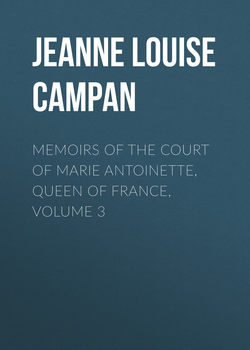Читать книгу Memoirs of the Court of Marie Antoinette, Queen of France, Volume 3 - Jeanne Louise Henriette Campan - Страница 2
CHAPTER VII
ОглавлениеThe winter following the confinement of the Comtesse d'Artois was very severe; the recollections of the pleasure which sleighing-parties had given the Queen in her childhood made her wish to introduce similar ones in France. This amusement had already been known in that Court, as was proved by sleighs being found in the stables which had been used by the Dauphin, the father of Louis XVI. Some were constructed for the Queen in a more modern style. The Princes also ordered several; and in a few days there was a tolerable number of these vehicles. They were driven by the princes and noblemen of the Court. The noise of the bells and balls with which the harness of the horses was furnished, the elegance and whiteness of their plumes, the varied forms of the carriages, the gold with which they were all ornamented, rendered these parties delightful to the eye. The winter was very favourable to them, the snow remaining on the ground nearly six weeks; the drives in the park afforded a pleasure shared by the spectators.
[Louis XVI., touched with the wretched condition of the poor of Versailles during the winter of 1776, had several cart-loads of wood distributed among them. Seeing one day a file of those vehicles passing by, while several noblemen were preparing to be drawn swiftly over the ice, he uttered these memorable words: "Gentlemen, here are my sleighs!"—NOTE BY THE EDITOR.]
No one imagined that any blame could attach to so innocent an amusement. But the party were tempted to extend their drives as far as the Champs Elysees; a few sleighs even crossed the boulevards; the ladies being masked, the Queen's enemies took the opportunity of saying that she had traversed the streets of Paris in a sleigh.
This became a matter of moment. The public discovered in it a predilection for the habits of Vienna; but all that Marie Antoinette did was criticised.
Sleigh-driving, savouring of the Northern Courts, had no favour among the Parisians. The Queen was informed of this; and although all the sleighs were preserved, and several subsequent winters lent themselves to the amusement, she would not resume it.
It was at the time of the sleighing-parties that the Queen became intimately acquainted with the Princesse de Lamballe, who made her appearance in them wrapped in fur, with all the brilliancy and freshness of the age of twenty,—the emblem of spring, peeping from under sable and ermine. Her situation, moreover, rendered her peculiarly interesting; married, when she was scarcely past childhood, to a young prince, who ruined himself by the contagious example of the Duc d'Orleans, she had had nothing to do from the time of her arrival in France but to weep. A widow at eighteen, and childless, she lived with the Duc de Penthievre as an adopted daughter. She had the tenderest respect and attachment for that venerable Prince; but the Queen, though doing justice to his virtues, saw that the Duc de Penthievre's way of life, whether at Paris or at his country-seat, could neither afford his young daughter-in-law the amusements suited to her time of life, nor ensure her in the future an establishment such as she was deprived of by her widowhood. She determined, therefore, to establish her at Versailles; and for her sake revived the office of superintendent, which had been discontinued at Court since the death of Mademoiselle de Clermont. It is said that Maria Leczinska had decided that this place should continue vacant, the superintendent having so extensive a power in the houses of queens as to be frequently a restraint upon their inclinations. Differences which soon took place between Marie Antoinette and the Princesse de Lamballe respecting the official prerogatives of the latter, proved that the wife of Louis XV. had acted judiciously in abolishing the office; but a kind of treaty made between the Queen and the Princess smoothed all difficulties. The blame for too strong an assertion of claims fell upon a secretary of the superintendent, who had been her adviser; and everything was so arranged that a firm friendship existed between these two Princesses down to the disastrous period which terminated their career.
